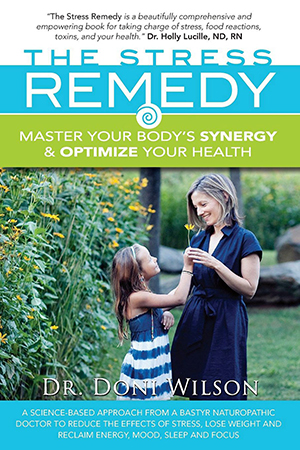How to improve your response to stress

Dr. Doni Wilson is a naturopathic doctor, professional midwife, clinical nutritionist, bestselling author, researcher, natural products formulator, and mother practicing in the New York. She is the author and creator of The Stress Remedy 7 and 21-day Programs, and the book The Stress Remedy.
‘To be alive is to encounter life’s demands, a.k.a. stress.’ — Dr. Doni Wilson
Most of the time, we think the root of stress is work, but “work” is a really broad umbrella that covers eight hours of the waking part of our days. Is it work that’s making you “stressed,” or are you just a little bit more irritable because you have indigestion, or didn’t get enough sleep, or lacking in vitamin D because you’ve been holed up in your cubicle? When I was diagnosed with severe anxiety two years ago, my doctor told me to take a two-month-long leave of absence upon his endorsement, which of course wasn’t possible. But what I learned from that whole ordeal was to not wait for a scheduled holiday for self-care — take it as often as you can, whether in five-minute doses or long, planned vacations.
Recently, I met a real-life stress guru, Bastyr naturopathic doctor, Dr. Doni Wilson, who radiates wellness from the soothing pitch of her voice to her perfectly cut blonde hair. She was in Manila to talk about her book, The Stress Remedy: Master Your Body’s Synergy & Optimize your Health, which she launched in partnership with Healthy Options. Her whole premise is that stress — good and bad — is a part of life, so instead of trying to avoid it, study how your body is affected by it and how to improve your body’s response. “To be alive is to encounter life’s demands, a.k.a. stress. No matter who we are or how we live, our relationship to stress is the source of all our joy and all our achievments. It’s also the source of most of our pain, sickness and ill health,” writes Dr. Wilson.
Thinking back on my past episode, it was a time with I was actually full of excitement and happily busy with projects; the downside was I wasn’t getting enough sleep, which made me irritable and powerless to the lure of junk food, which in turn made me feel too sluggish to work out. As Dr. Wilson mentions in the book, the body either creates “vicious cycles” or “virtuous cycles.” And that one was particularly vicious.
Identifying what kind of stress you are experiencing can help you in adjusting your routine or habits to better deal with it. She notes that stress can take three forms: 1) an unusually challenging set of demands; 2) a stress reaction that, in response to minor but unremitting demands, remains permanently “on”; and 3) disruptions to the optimal sleep and/or regular, balanced meals that our bodies require to function at their best, as well as disruptions caused by toxins, substances or inflammation.
She advises to minimize emotional sources of stress. She writes, “If possible, make changes in stressful relationships, jobs and family situations and find ways to make time for ‘stress relievers’ that help you feel balanced, refreshed and happy.” For me, anti-gravity yoga and at-home practice has been extremely helpful. Not only does it strengthen physically, it also balances the mind. Being literally upside-down gives me a new perspective on issues immediately after, as if dangling from the waist like a piñata releases negativity from my body.
Dr. Wilson also recommends minimizing toxins in one’s diet and environment to lessen physical and oxidative stress; as well as choosing to eat, sleep and exercise in a way that supports your synergy. In the book, she explains the details of the Hamptons Cleanse, a diet that she designed to reduce stress by decreasing energy disrupters. I’m about to try it (will let you know how it goes).
In the meantime, here are her tips on coping with stress daily:
Schedule 15 minutes of quiet time before going to sleep and before starting your day.
• Do yoga or exercise.
• Meditate or practice mindfulness.
• Read a book.
• Listen to music.
• Garden.
• Enjoy your pet.
• Get a pedicure or massage.
• Eat an ounce of dark chocolate.
• Drink tea.
• Call a friend or family member who makes you feel nurtured, special and appreciated.
• Write about your feelings in a journal.
• Laugh.
• Engage in any activity that gives you “brain space” and allows you to be by yourself to process.
Every one of these activities and how they benefit the body and mind are detailed in the book, which is a comprehensive guide to living healthy, covering diet, exercise, mental health and relationships. It even has easy-to-follow healthy recipes for those who would like to do the Hamptons Cleanse. To summarize, she lists three ways to live happy and healthy in spite of stress: analyze your stress, master your synergy and customize your health.
* * *
Dr. Doni Wilson’s book, The Stress Remedy: Master Your Body’s Synergy & Optimize your Health, is available for P1,495 at Healthy Options.




















